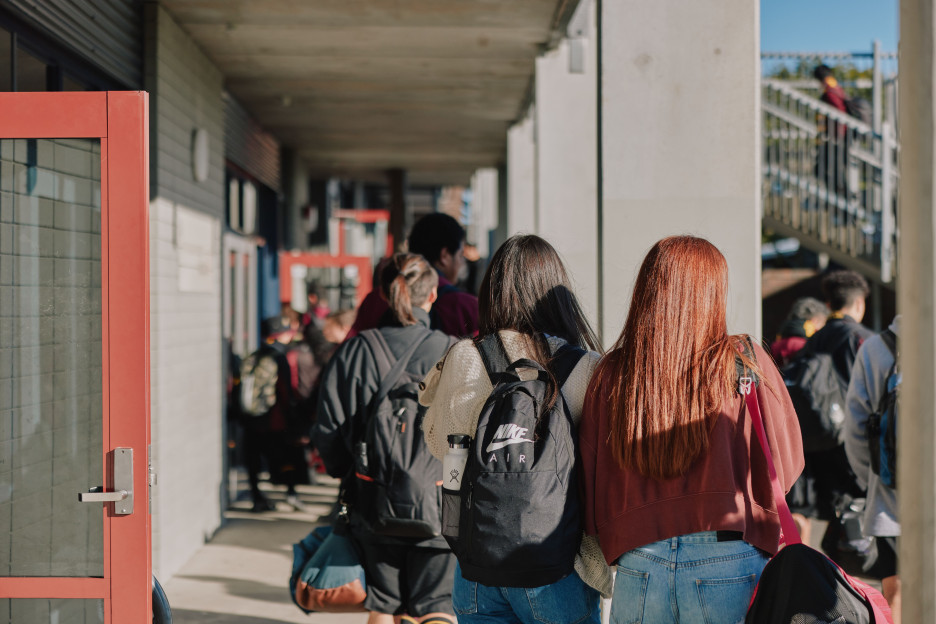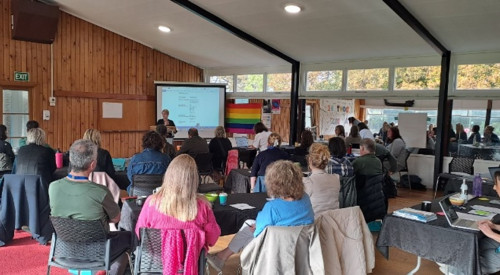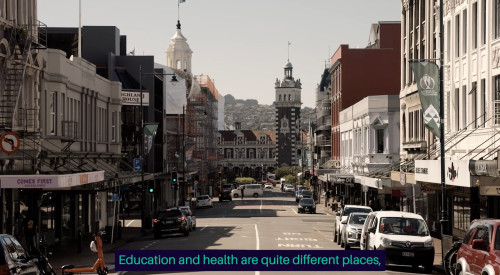How schools can support students from families under long-term strain
Case study 30 June 2023

“We are dealers in hope,” says Rachael Parker, Acting Principal at Huntly College.
Huntly is a socioeconomically deprived region of Aotearoa and Huntly College uses a sophisticated suite of strategies to support students who are dealing with all manner of issues. Many of these strategies are applicable to all educators in New Zealand working with students from families under long-term strain.
Factors that can put families under strain include poverty, intergenerational trauma, and harm from AoD, says Parker, who has been teaching at Huntly for nine years.
The “Yes” school philosophy
Parker’s approach to supporting students begins with being “a yes school”.
“The answer is always ‘yes’ – and then we solve the problem,” she says.
She uses the example of students thinking they shouldn’t be at school because they don’t have the right uniform. “We say, ‘Yes, that’s ok’ – we’re not going to send them home.”
“Students might be an hour late for school because they’ve had to walk their younger siblings to primary school and then walk back across town to get here. We say, ‘Yes, that’s ok’.”
Parker explains that often schools talk to students negatively, when students already know that they’re not doing so well.
“But if we can keep students in school until Year 12 and they are regularly attending classes and completing the work, they will get Level 1 – and Level 2 (NCEA). And that gives them options.”
Hauora in action
Parker believes strongly in a whole school hauora approach, and has instituted a weekly Tuesday morning Hauora meeting. Senior school leaders attend, along with whānau house leaders, the guidance counsellor, the attendance officer, and a youth worker who’s connected to the school through a local programme. The school also has access to a part-time doctor and nurse. Student representation will soon be included at the meeting. Parker says the outcome of this approach has been the students feeling supported, having free school lunches and can access resources barrier free. “They have an improved sense of belonging, knowing there are people at kura that have their back,”.
Addressing attendance issues
The school was hit particularly hard by attendance issues due to Covid, and appreciates support introduced last year to help schools re-engage with whānau.
“Our attendance officer is doing an amazing job. She gets more insight into what is actually going on in the home. So, she’ll disclose that there is no food in the house, and she’ll ask if she can take some of the KidsCan food. And we’ll say, ‘Of course, that’s what it’s there for.’”
It might be that older children are at home looking after younger siblings because parents are having to get to work. So, it’s about engaging with whānau and really finding out what is going on. “We’re beyond the three-prong approach – school, student, parents. It’s about knocking on doors and talking to find ways to engage the whānau.”
Being a “Yes’ school has resulted in significant reduction of the use of exclusion than in the past, and certainly different from National data which has shown the number for standdowns for smoking had more than doubled between 2012 and 2020. When exclusions are used, it is viewed as a last resort and when all over avenues have been engaged with. Parker says Huntly College finds that it is also important to focus on how their student return to school and are set up for success.
Reimagining parent-teacher interactions
The traditional parent-teacher interviews may not be appropriate either when their circumstances prevent whānau from attending. Whānau do want what is best for their children, but they may be unable to engage in the usual ways.
Crucially, students need a sense of belonging at school and to have a purpose so that they have access to options when they leave school. “It’s our core business that we ensure every student who walks through our doors leaves school with dignity, purpose and options,” Parker says.
The school has close links to external agencies and meets once a fortnight with Police and Oranga Tamariki and representatives from other local schools. A local programme is designed to keep students out of the criminal justice system – it’s a form of alternative education for children aged 8 to 14.
The evidence is clear that keeping children in school is best for them – and for communities, with a link between school absences and youth crime.
Understanding students’ needs
“There are so many contributing factors that have an impact on the student’s ability to learn – there can be sleep issues from overcrowding, nutrition issues, and high levels of anxiety and other mental health issues, but everyone has something that they’re good at and it’s up to schools to nurture that. It’s part of our vision – we say Ake ake te teo o te tangata, which basically translates as ‘nurture the indescribable light within’.
“What we say to the kids is, ‘It’s not that we don’t like you, it’s that we just don’t like the behaviours you’re doing.’ Because they are really cool kids.”
Parker says that her role as a Principal is to ensure that every person who comes into the school is safe – mentally, emotionally and physically. Systems, processes and structures need to be in place to ensure this. “It means the chaos of school life is kept to a minimum so that learning can take place. You have to have systems, then the school is a well-oiled machine – all that is important.”
At the same time, there is no quick fix or magic bullet solution to deep problems – and serious incidents still happen. New students will arrive and bring new challenges. Some students may need immediate wraparound interventions. Very occasionally there will be an exclusion or a student may only be able to attend if they follow strict conditions. But the systems are in place to respond, rather than react.
“We are building a learning system, and we continue to work to develop and enhance wellbeing. Social media fuels tensions in the school and we will have to think about that. Some schools are banning devices – it’s something to think about. Yet we are getting students to attend and then we have the ability to put some effective measures in place to improve change for everyone.
“It’s not something that can be rushed into. It does take time – to ensure learning does take place. We have to think about how to do that for every individual student who comes here, and some with such complex needs.”
Every town and city is different, and the available services will be different, but most schools will have services in their community that they can access.
Tūturu
Tūturu was developed using the latest evidence of what’s effective at helping young students be healthy and engaged at school. Tūturu brings schools and health providers together to create a comprehensive approach to wellbeing for students that covers everything from school climate, pastoral care, professional learning and development and curriculum resources for students in Years 9-13. There are a variety of ways that Tūturu can support you in a tailored way to meet your schools unique needs. Among our suite of curriculum resources is a guide to assist teachers supporting students from families experiencing long term strain.
Recent news

Supporting Students: A Wellbeing Lens – Dunedin Tūturu Whole School Approach Day 2024
2 July 2024
In May, schools from throughout Otago and staff from orgs such as Te Whatu Ora, NZ Police and MOE gathered to hear from a range of speakers on how best to meet the needs of secondary school students.
How can schools better handle student mental health and wellbeing? Insights from NZCER's secondary principals' survey
25 March 2024
In November 2023, the results of a 2022 nationwide survey of secondary school principals in Aotearoa revealed that the top issue they ranked dealing with at school was providing support for students grappling with mental health or wellbeing issues.

Tūturu in Ōtepoti Dunedin
19 February 2024
Whakaata Tohu Tohu | Mirror Services, works with multiple schools in Ōtepoti.